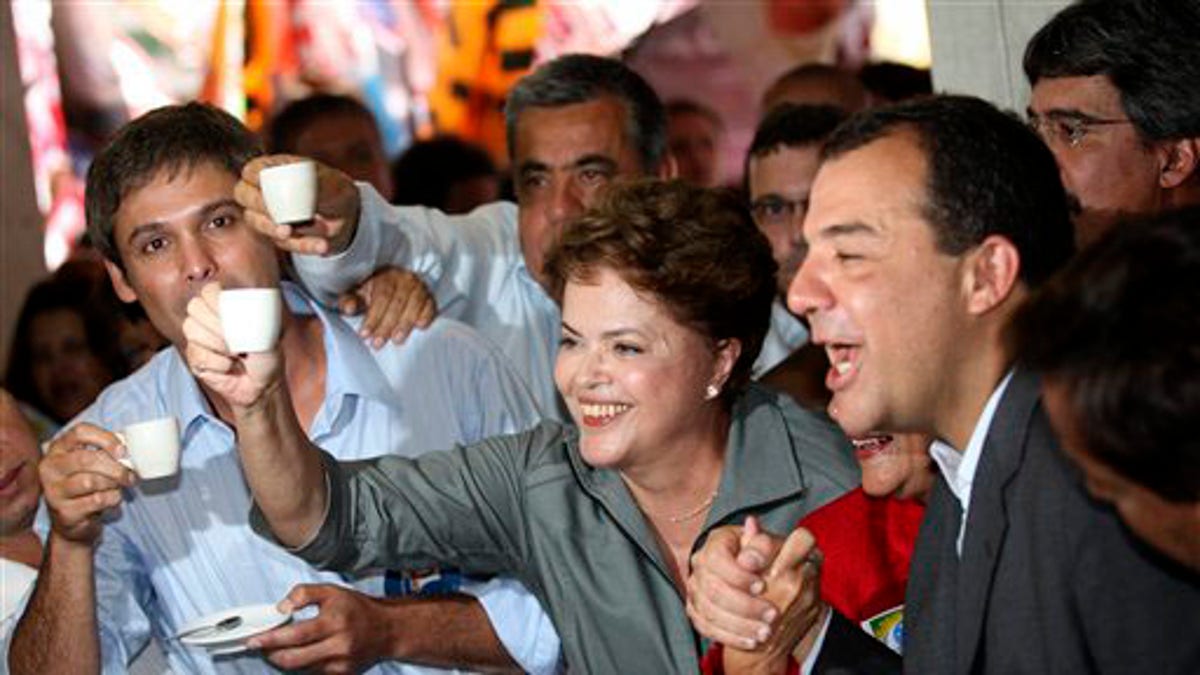
Brazil's Workers party presidential candidate Dilma Rousseff, center, holds up a cup of coffee at a coffee shop during a campaign rally in Rio de Janeiro, Brazil, Monday, Sept. 20, 2010. (AP)
Brazilian President Dilma Rousseff faced a tough challenge in simply having to follow in the footsteps of her wildly popular political mentor Luiz Inacio Lula da Silva.
But her political path during her first seven months in office has been rockier still, having seen scandals push two of her ministers from their posts and this week being being forced to fire her defense minister after he made a series of acerbic comments that seemed to openly challenge her leadership.
Some may miss the colorful charisma of former President Silva, but Rousseff is holding her government together with her trademark results-oriented demeanor and the swift action taken to weed out officials facing corruption allegations.
The latest official to exit was Defense Minister Nelson Jobim, who created his own downfall by recently saying he voted for Rousseff's opponent in last year's election, that he was surrounded by "idiots" in her government and by insulting two other ministers this week.
Jobim, who filled the same post under Silva, was replaced by former Foreign Minister Celso Amorim.
"She didn't have any alternative," said David Fleischer, a political scientist at the University of Brasilia. "He pulled a real no-no. You have a female president and you talk badly about two of her female ministers? It's a nasty scene."
Since taking office Jan. 1, Rousseff first saw her chief of staff Antonio Palocci forced from his post in June amid questions over how his personal wealth soared while he was a legislator in 2006-10. Rousseff was criticized for not taking a public stance early in the Palocci scandal and that she allowed it to play out longer than it should have.
So when corruption allegations surfaced against Transportation Minister Alfredo Nascimento in July, Rousseff took swift action to remove him from that post, and has subsequently fired more than two dozen other officials in the ministry linked to a purported kickback and overbilling scheme.
Some have viewed her action as an overreach, though she has been widely commended for taking on corruption in a country that has long been plagued by it.
"I think it all demonstrates strength," Fleischer said.
In the most recent nationwide opinion poll on her presidency, 49 percent of Brazilians rated her as doing a "good" job. That poll was carried out in June, before the fall of Jobim but after the potentially more damaging episode with Palocci, who was viewed as Rousseff's right-hand man.
That Datafolha poll interviewed 2,188 people across Brazil on June 9 and 10. It had a margin of error of plus or minus two percentage points, which puts it as statistically even with the results of a March Datafolha poll.
Francisco Fonseca, a Sao Paulo-based political scientist with the Getulio Vargas Foundation, a Brazilian think tank, said the shuffling in Rousseff's cabinet was unlikely to seriously threaten her, as she is seen as carrying on the popular policies of Silva.
"It's true she lost three ministers quickly, but it's a government of continuity and these seem like realignments within it," said Fonseca.
Rousseff is known for having a sharp temper and an all-business demeanor, which in itself was a change for voters used to the congenial Silva, Rousseff's political mentor and the man responsible for her winning the presidency, despite her never having held elected office before.
Silva, the nation's first working-class president, used folksy language in speeches and openly weeped when he won the presidency. Brazil's first female president, by contrast, comes off as a wonkish technocrat, despite a fiery youth that included battling Brazil's military government as a leftist militant, action for which she was imprisoned for three years and tortured. Silva left office this year with an 83 percent approval rating.
Most analysts point out that the nation's democracy has matured and voters are content with a less charismatic, no-nonsense president like Rousseff.
However, her lack of political skills could hinder Rousseff as she tries to hold together a fractious ruling coalition and push through economic and political reforms in Congress. Additionally, the smooth ride Brazil's economy has enjoyed of late could begin to sour as the global situation worsens. That could turn voters against her if they feel less protected from economic shocks.
Like Jobim, Amorim is a throwback to the Lula administration and is not expected to bring great change to the defense minister post. The newspaper O Globo pointed that out with a headline reading, "Dilma trades Lula minister with Lula minister."
Amorim is likely to have differences with military leaders over an ongoing Congressional debate about Brazil establishing a truth commission to investigate crimes carried out during the nation's 1964-85 military dictatorship.
But Amorim is also viewed as a patriot whose wants to see a globally powerful Brazil, sentiments that play well with military leaders.
"He's very much a nationalist, so the military will agree with that," said Fleischer.
